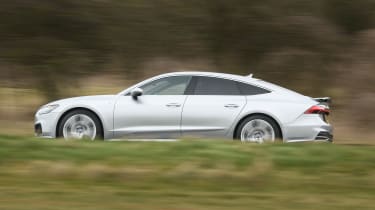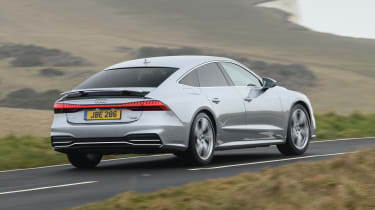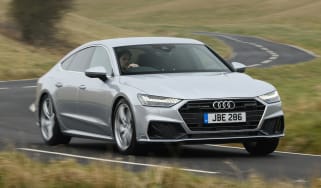Audi A7 Sportback review - MPG, running costs & CO2
Advanced fuel-saving technology in the Audi A7 Sportback reduces impact of choosing a large engine
While the A7 launched with a variety of engine options, most of the largest ones have been discontinued, leaving just a 2.0-litre diesel, petrol or plug-in hybrid option, but previously offered engine options will still be available on the used market.
It may be a big car, but the A7 features some impressive technology to help give it the fuel-efficiency of a smaller model. Versions fitted with a V6 engine are equipped with a 48-volt mild hybrid system that harvests energy while you brake and stores it in a small lithium-ion battery. This electricity can then be used by other features in the car, taking some strain off the engine.
One such function allows the A7 to coast safely with the engine automatically switched off at speeds of between 34 and 99mph, then restart almost imperceptibly when you press the accelerator. A beefed-up alternator and clever software also means the start and stop system works more of the time, functioning at speeds below 13mph, then restarting more intuitively by using cameras to sense when the traffic ahead pulls away.
Audi A7 Sportback MPG & CO2
Audi offers the A7 Sportback with a four-cylinder 2.0-litre diesel engine badged 40 TDI. Despite being a big car, it can return up to 49.6mpg and emits from 150g/km of CO2 with 19-inch alloy wheels fitted, which means a 35% BiK rating at best. The economy is achieved despite the fact it only has a 12-volt mild-hybrid setup that doesn't offer features like engine-off coasting.
More reviews
The discontinued 3.0-litre 45 TDI and 50 TDI engines are thirstier, returning up to 39.8mpg, along with CO2 figures from 176g/km and a top BiK rating of 37%.
There’s also a petrol 2.0-litre 45 TFSI option but the fact it still has quattro means it doesn't offer quite the economy you might expect. It can return up to 36.2mpg and emits at least 177g/km of CO2, so still has a high BiK tax.
Discontinued petrol engines include the 3.0-litre V6 TFSI petrol 55 TFSI, which can return up to 33.2mpg and emits from 194g/km of CO2, figures that don’t appear exceptional but aren’t too bad considering the car’s performance.
Economy is far better when coupled with an electric motor in the plug-in hybrid Audi A7 50 TFSIe models (the more powerful 55 TFSIe model was discontinued in 2022). These plug-in models have a large 17.9kWh battery pack fitted, giving its electric motor enough power for a 31-mile potential driving range and CO2 emissions from 32g//km for significantly lower BiK rates, making it the company car choice of the lineup.
In theory, many drivers will be able to carry out their commute without using a single drop of fuel, even with brief stints on the motorway. The powertrain can also act as a hybrid, juggling power between the electric motor and internal combustion engine depending on how the car is being driven. Charging the battery pack takes around 2.5 hours using a 7kW home wallbox.
Because it costs over £40,000, the Audi A7 costs £600 in annual road tax in years two to six, after which it returns to the standard rate (£190 in mid 2024) – the plug-in hybrid is classed as an alternative-fuel vehicle, so the 50 TFSIe gets a reduction of £10.
Insurance groups
The A7 Sportback isn’t cheap to insure because it’s expensive and powerful. The Sport 40 TDI is the most affordable, residing in group 42. The 45 TFSI models start in groups 43 out of 50, while the 50 TFSIe starts from group 46.
Warranty
Like all other Audi models, the A7 comes with a standard three-year/60,000-mile warranty that can be extended if you pay an additional cost. This is fairly stingy, with BMW offering a three-year/unlimited-mileage warranty, and some manufacturers providing five or even seven years as standard.
Servicing
Audi has fixed prices for its servicing, while also offering servicing plans. The latter allows you to pay upfront for a set period of maintenance, or spread the cost over monthly payments to make it easier to budget for servicing.
Which Is Best?
Cheapest
- Name40 TDI Quattro Sport 5dr S Tronic
- Gearbox typeSemi-auto
- RRP£58,940
Most Economical
- Name50 TFSI e Quattro Sport 5dr S Tronic
- Gearbox typeSemi-auto
- RRP£69,040
Fastest
- NameS7 TDI Quattro Black Edition 5dr Tronic Auto
- Gearbox typeSemi-auto
- RRP£81,295














